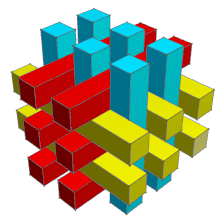 Tetrastix arrangement showing 6 sticks in each direction
Tetrastix arrangement showing 6 sticks in each direction
In geometry, it is possible to fill 3/4 of the volume of three-dimensional Euclidean space by three sets of infinitely-long square prisms aligned with the three coordinate axes, leaving cubical voids;[1][2] John Horton Conway, Heidi Burgiel and Chaim Goodman-Strauss have named this structure tetrastix.[3]
- ^ Cite error: The named reference
sss was invoked but never defined (see the help page).
- ^ Cite error: The named reference
rod was invoked but never defined (see the help page).
- ^ Cite error: The named reference
cbg was invoked but never defined (see the help page).
